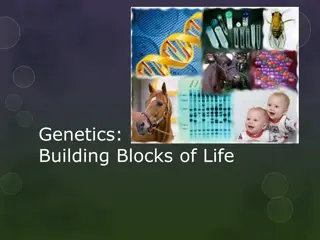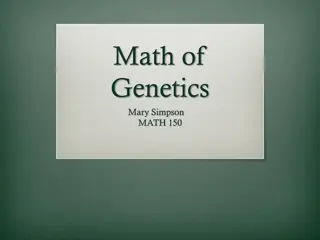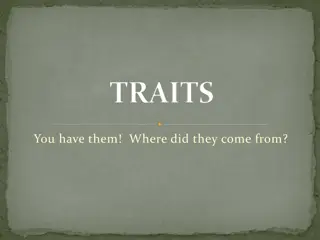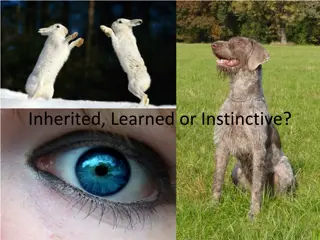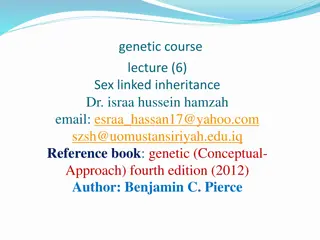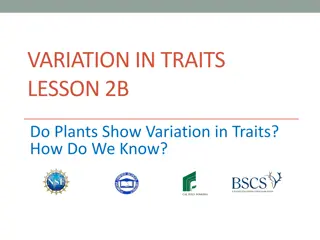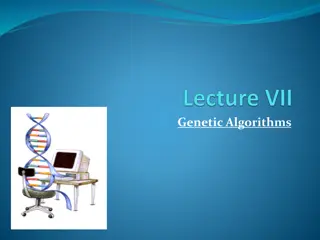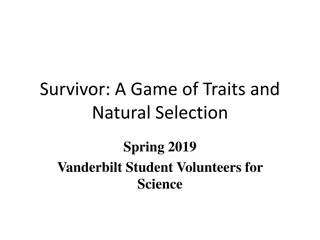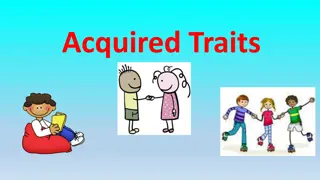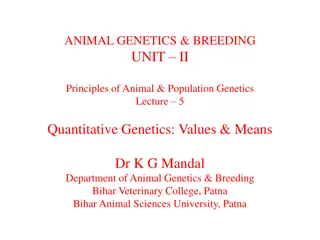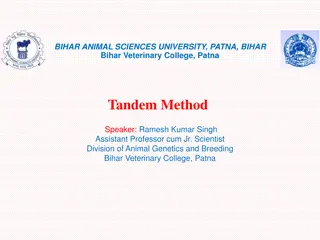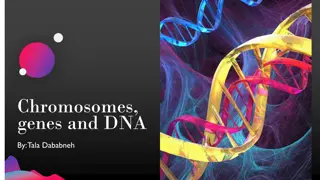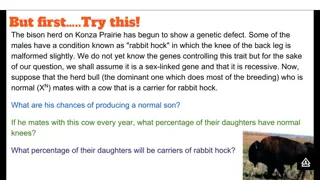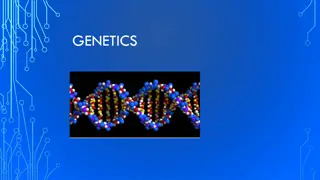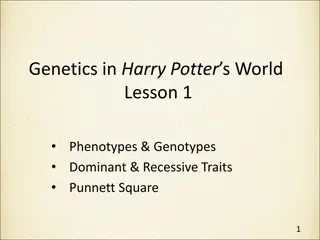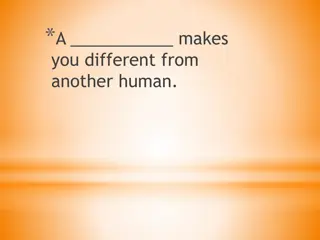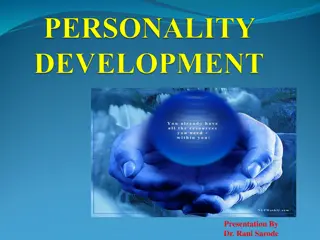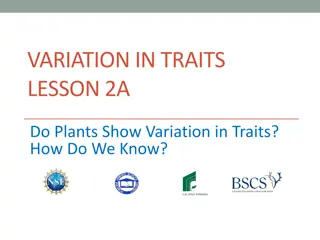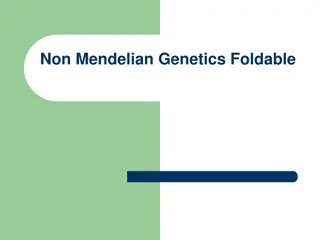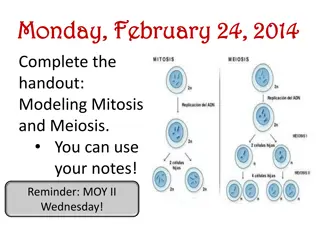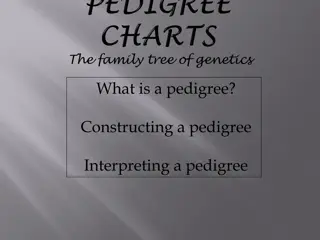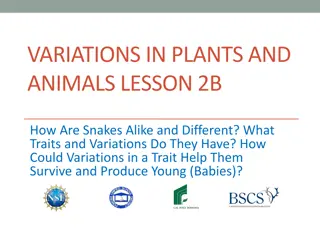Genetics: The Blueprint of Life
Genetics is the study of heredity and how traits are passed from parents to offspring. It involves understanding genetic makeup (genotype) and physical attributes (phenotype) determined by genes. Mendel's laws of segregation and independent assortment explain how alleles and traits are inherited. Nu
0 views • 34 slides
Exploring the Basics of Genetics and Inheritance
Understanding the fundamentals of genetics and inheritance, this content covers topics such as Mendelian genetics, gene inheritance, chromosomes, alleles, and Gregor Mendel's pioneering work. It delves into genetic outcomes related to multiple traits, linkage, dominance, Hardy-Weinberg equations, an
0 views • 87 slides
Unraveling the Mystery of Traits and Genes
Explore the fascinating world of traits and genes, understanding how they are passed down from parent to offspring through chromosomes. Delve into the role of genes in controlling various traits such as hair color, eye color, and even unique characteristics like detached earlobes and widow's peak. D
0 views • 11 slides
Understanding Cultural Traits and Complexes in Society
Culture is a complex whole that encompasses various aspects such as knowledge, beliefs, arts, morals, laws, customs, and more. Cultural traits, at the simplest level, are individual tools, acts, objects, or beliefs related to specific situations or needs, while cultural complexes are groups of inter
0 views • 18 slides
Understanding Inherited, Learned, and Instinctive Traits in Organisms
Traits in organisms can be inherited, learned, or instinctive. Inherited traits are genetic and include characteristics like hair color and disease predispositions. Instinctive traits are inherent behaviors such as sleeping and grooming. Learned traits are behaviors acquired for survival, like house
0 views • 20 slides
Understanding Sex-Linked Inheritance: Key Concepts and Examples
Sex-linked inheritance refers to the transmission of genetic traits determined by genes located on the sex chromosomes. This type of inheritance differs from autosomal inheritance due to the unique characteristics of the X and Y chromosomes. In organisms with XX/XY sex determination, genes on the X
1 views • 21 slides
Exploring Plant Traits: Do Plants Exhibit Variation in Traits?
Discover in this lesson whether plants display variations in traits through the measurement of plant lengths. Students analyze data tables of carrots and leaves to observe trait variations and discuss patterns found in bar graphs and data tables. The focus is on understanding how to identify and int
0 views • 11 slides
Exploring Leadership Theories: Traits and Behaviors
Leadership theories have evolved from trait theory focusing on personal qualities to behavioral theories emphasizing actions and interactions. While early research sought universal traits for leadership, it encountered challenges due to varied traits among leaders and non-leaders. Behavioral theorie
2 views • 29 slides
Understanding Genetic Algorithms and Natural Selection
Genetic Algorithms (GAs) are based on Darwin's Principle of Natural Selection. Introduced in the 1960s, they use evolutionary computing to optimize solutions. The process mimics nature, where the best traits survive and propagate, leading to the evolution of species. Through examples like giraffes a
0 views • 75 slides
Contrasting Qualitative and Quantitative Traits in Genetics
Genetic traits in organisms can be qualitative or quantitative, with qualitative traits controlled by single genes and showing distinct variations, while quantitative traits are influenced by multiple genes and environmental factors, resulting in continuous variations. Qualitative genetics focuses o
0 views • 13 slides
Understanding Personality Traits and Assessments
Psychologists utilize traits to describe personality, addressing common misunderstandings about introversion and exploring the strengths and weaknesses of personality inventories. The consistency of personality traits over time and across situations is examined, along with the identification of insi
0 views • 38 slides
Explore the Science of Natural Selection and Traits
Dive into the fascinating world of natural selection and traits with a focus on how organisms adapt to their environments. Learn about the importance of Charles Darwin's theories, the role of traits influenced by genes and the environment, and how natural selection drives the survival of the fittest
4 views • 13 slides
Understanding Acquired Traits and Learned Behaviors in Living Organisms
Acquired traits are physical characteristics acquired during a living thing's lifetime, such as scars, and are not passed down from parents. Many acquired traits are also learned behaviors, like reading or flying, which animals develop after birth. Learned behaviors, unlike inherited instincts, are
5 views • 15 slides
Understanding Quantitative Genetics Principles in Animal Breeding
Quantitative genetics focuses on the inheritance of characteristics based on degree rather than kind, compared to qualitative genetics. It involves polygenes controlling quantitative traits, which exhibit continuous variation and can be measured using metric units. Qualitative traits, on the other h
0 views • 22 slides
Tandem Method in Animal Breeding: Sequential Traits Selection
Tandem method in animal breeding involves selecting useful traits sequentially to improve genetic performance. Breeders focus on one trait until a desired level is achieved before moving on to the next trait. While effective in targeted improvement, the method can lead to loss of previously improved
0 views • 6 slides
Exploring Ancestry and Traits Through SNPedia and PCA Analysis
Delve into the world of genetics and ancestry analysis through SNPedia, a comprehensive resource for Single Nucleotide Polymorphisms (SNPs) information. Discover how Principle Component Analysis (PCA) simplifies genetic data to reveal insights into ancestry, traits, and informative SNPs. Explore exa
0 views • 33 slides
Understanding Chromosomes, Genes, and DNA in Genetics
This educational material explores the fundamentals of chromosomes, genes, and DNA, highlighting how genetic material is inherited from parents, determining traits such as eye color, blood type, and more. It explains the relationship between chromosomes, genes, and DNA, emphasizing their importance
0 views • 14 slides
Understanding Stored and Inherited Relations in Relational Databases
Explore the concept of Stored and Inherited Relations (SIR) in relational databases, as discussed by Witold Litwin at Dauphine University. Discover how a typical scheme of a stored relation defines a natural SIR, leading to more efficient query formulations and less procedural querying processes. Le
0 views • 27 slides
Understanding Linked Genes and Genetic Mapping in Inheritance
Linked genes inherited together on chromosomes influence genetic traits. Discover the differences between sex-linked and linked genes, the concept of crossing over, linkage mapping, and the significance of gene distance in recombination. Explore the work of Alfred Sturtevant in gene mapping through
1 views • 21 slides
Understanding Genotype and Phenotype in Hereditary Traits
Exploring simple heredity through predicting and modeling phenotypes of Crazy Creatures, students are tasked with contrasting genotype and phenotype. The Crazy Traits lab data table is essential for recording alleles and genotypes, aiding in determining phenotypes for 14 different traits. By complet
0 views • 4 slides
Exploring the Legacy of Gregor Mendel: Pioneer of Genetics
Gregor Mendel, a father monk in the 1800s, conducted groundbreaking research on how traits are inherited through plants, laying the foundation for modern genetics. Despite initial lack of recognition, his work on pea plants led to the discovery of genetic factors and the understanding of hereditary
0 views • 43 slides
Understanding Genetics in Harry Potter's World
Explore the inherited genetic traits in the Harry Potter series, including phenotypes and genotypes of characters like the Weasleys, Draco Malfoy, and Harry Potter. Delve into observable traits like freckles, hair color, eye color, and height, and learn how to apply genetics concepts through example
0 views • 29 slides
Understanding Objective Personality Tests and Traits
Explore various objective personality tests and traits, including examples of uni-dimensional traits such as Locus of Control, Type A/B personalities, Tolerance for Ambiguity, Need for Cognition, Bem Sex-Role Inventory, and more. Delve into the concepts introduced by psychologists like Julian Rotter
0 views • 14 slides
Understanding Genetics and Evolution through Traits and Adaptation
Exploring concepts like traits, mutations, adaptations, and genetic changes in organisms to comprehend what makes individuals unique and how species evolve and adapt over time. The content delves into the inheritance of traits, the role of DNA segments, and distinguishing characteristics in living b
0 views • 29 slides
Exploring Personality Development and Traits
Understanding the importance of personality development, this presentation by Dr. Rani Sarode delves into the various aspects that define an individual's character and behavior. It discusses the significance of traits like communication skills, interpersonal relationships, attitude towards life, and
0 views • 24 slides
All About Team Building, Teamwork, and Leadership Traits
Explore the importance of team building, teamwork, and essential leadership traits. Learn about the purpose of a team, the need for teams in companies, forming effective teams, and the character traits that contribute to team success. Discover roles and responsibilities within a team to enhance coop
0 views • 33 slides
Basic Biology of Plasmid and Phage Vectors
Plasmids are replicons inherited extrachromosomally, existing as circular DNA molecules. They can be categorized as conjugative or non-conjugative based on transfer genes presence, and by copy number per cell. Linear plasmids and their maintenance mechanisms are also discussed, along with phenotypic
0 views • 13 slides
Exploring Plant Traits: Understanding Variation in Characteristics
Delve into the world of plant traits and variation in this interactive lesson. Discover how plants exhibit different traits and explore the concept of variation within species. Engage in investigations, measurements, and discussions to deepen your understanding of plant characteristics. Uncover the
0 views • 12 slides
Leadership Insights: Traits, Differences, and Framework
Leadership involves guiding others towards shared goals through vision, inspiration, knowledge, and resilience. It distinguishes from management in focus and approach. Analyzing leadership involves assessing leader traits, situational factors, and follower dynamics. The leadership framework comprise
0 views • 36 slides
Non-Mendelian Genetics Foldable
Explore the world of non-Mendelian genetics through a hands-on foldable activity. Learn about codominance, incomplete dominance, multiple alleles, epistasis, polygenic traits, gametes, and more in a visually engaging manner. Understand how traits are inherited and expressed in ways beyond traditiona
0 views • 10 slides
Understanding Genetic Linkage in Maize and Drosophila
The concept of genetic linkage is explored through experiments in maize and Drosophila, showcasing how specific traits are inherited together due to their close association on chromosomes. In maize, the phenomenon of linkage is demonstrated through color and endosperm traits, while in Drosophila, co
0 views • 11 slides
Understanding Genetics: Mendel's Experiments and Inheritance Patterns
Delve into the world of genetics through Mendel's groundbreaking experiments with pea plants, exploring traits inheritance, Punnett squares, dominant and recessive alleles, incomplete dominance, and co-dominance. Gain insights into how traits are passed from parents to offspring and predict offsprin
0 views • 9 slides
Understanding Pedigree Charts in Genetics
A pedigree chart is a visual representation of how a particular trait is inherited over several generations within a family. By examining these charts, one can identify carriers of specific traits and determine the likelihood of passing on genetic disorders to future generations. The construction an
0 views • 22 slides
Exploring Snake Traits and Variations
Delve into the world of snakes to understand their shared traits and diverse variations. Discover how these variations in traits help snakes survive and reproduce, offering insights into their unique characteristics and evolutionary advantages.
0 views • 14 slides
Unveiling Leadership Traits and Emotions Through Your Journey
Explore the essence of leadership traits and emotions in a visually captivating journey that delves into understanding and mastering the intricacies of leadership. From uncovering your unique traits to navigating through team dynamics, this collection of images offers insights to enhance your leader
0 views • 12 slides
Leadership Skills Overview: Traits, Theories, and Development
Explore leadership skills presented by Dr. Pushpinder Kaur Benipal, covering traits like adaptability, decisiveness, and social skills. Delve into early and functional leadership theories, understanding the importance of behavior over traits. Develop your own leadership potential with insights into
0 views • 15 slides
Understanding GWAS: A Brief Overview of Genetic Association Studies
GWAS, or Genome-Wide Association Studies, are a method used to map genes associated with traits or diseases by analyzing genetic markers throughout the genome. This process involves statistically testing the association between SNPs and traits using regression or chi-squared tests in a hypothesis-fr
0 views • 19 slides
ASTA.V&F Seed Conference 2015 - EI WG: Advancing Global Access to Plant Breeding Traits
The ASTA.V&F Seed Conference 2015 - EI WG focused on the launch of the International Licensing Platform Vegetable (ILP Vegetable) to enhance global accessibility to plant breeding traits. Discussions revolved around patents' impact on innovation, with 11 prominent companies collaborating to establis
0 views • 18 slides
Gregor Mendel: The Father of Genetics and His Pea Plant Experiments
Gregor Mendel, an Austrian botanist monk, laid the foundation for the study of heredity with his groundbreaking work on pea plants in the mid-1800s. By observing traits across generations, Mendel formulated the basic laws of genetics, demonstrating how traits are inherited. His experiments with pure
0 views • 18 slides
Understanding Personality and Self-Esteem: Exploring Traits and Mental Health
Exploring personality traits, self-esteem, and mental health through definitions, group activities, and descriptions of extroverts, introverts, optimists, pessimists, and realists. The content covers creating lists of personality traits, identifying assertive behaviors, and outlining objectives rela
0 views • 68 slides
